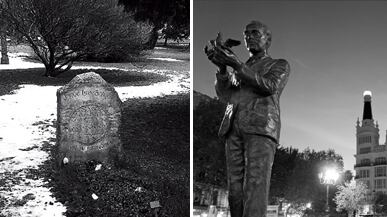GENEVA
I’m in Geneva and I’m looking for the cemetery where the writer Jorge Luis Borges is buried. It’s a cold autumn morning, although to the east there’s a glimpse of sun, a few rays that cheer the citizens of Geneva, a stubborn people of great democratic tradition. The Plainpalais is the perfect cemetery: the kind of place to come every afternoon to read a book, sitting across from the grave of some government minister. It’s really more like a park than a cemetery, an extremely manicured park, every inch well tended. When I ask the keeper about Borges’s grave, he looks down at the ground, nods, and tells me how to find it, his words precise. There’s no way to get lost. From what he says it’s clear that visitors are always coming and going. But this morning the cemetery is literally empty. And when I finally reach Borges’s grave there’s no one nearby. I think about Calderón, I think about the English and German Romantics, I think how strange life is, or, rather: I don’t think anything at all. I just look at the grave, the stone inscribed with the name Jorge Luis Borges, the date of his birth, the date of his death, and a line of Old English verse. And then I sit on a bench facing the grave and a raven says something in a croak a few steps from me. A raven! As if instead of being in Geneva I were in a poem by Poe.

More From The City Series • Author Francisco Goldman Reflects on Mexico• Peter Goldwin on Harare, Zimbabwe• Jean-Marie Gustave Le Clézio: Mixed Feelings in Nice• Junot Diaz Savors The Insane Urbanism of Tokyo• P.J. O'Rourke's Hometown of Toledo, OhioOnly then do I realize that the cemetery is full of ravens, enormous black ravens that hop up on the gravestones or the branches of the old trees or run through the clipped grass of the Plainpalais. And then I feel like walking, looking at more graves, maybe if I’m lucky I’ll find Calvin’s, and that’s what I do, growing more and more uneasy, with the ravens following me, always keeping within the bounds of the cemetery, although I suppose that one occasionally flies off and goes to stand on the banks of the Rhone or the shores of the lake to watch the swans and ducks, somewhat disdainfully, of course.
MADRID
Of the many hotels in Madrid, I prefer the ones between the Plaza de Santa Ana and the Plaza de Lavapiés. Just like when I used to hitchhike and I could go for days without eating or sleeping. Although I'm acquainted with better hotels, like the Wellington, where one day I saw the Baroness von Thyssen sitting alone in the lobby, wrapped in a white fur coat as if it were a shield or the kind of rough quilt that bums and the homeless use to protect themselves from the winter, rapidly acquiring a look that was less baroness than commoner.
When you think about it, living in Madrid or being there isn't much different from living or being in Tacuarembó. The air, maybe, is different. It's so clear that sometimes it blinds the soul, allowing us to see more clearly: the notional streets and the Castilian Spanish, the kind of slang they speak so well in the old capital of the mother country.
And the women, the native daughters of Madrid, the blondes and the brunettes, add mystery to a place already rich in mystery, although it's well known that the Spanish, like Latin Americans, aren't just poorly educated but also bad in bed. That's the source of the look one sees in the eyes of the women of Madrid: part sarcasm and part Merimée.
The truth is that Madrid is a city that doesn't exist—despite the warriors and priests who left the capital and never came back, despite the women of Madrid, melancholy and practical in the Meseta's least pragmatic region.
Or maybe Madrid is an imaginary city, to which one has to hitchhike, not fly, and to which one can come only when one is 25, not nearly 50.
Bolaño died in 2003. A posthumous collection of his essays, Between Parentheses, will be published in May.
Plus: Check out Book Beast, for more news on hot titles and authors and excerpts from the latest books.






